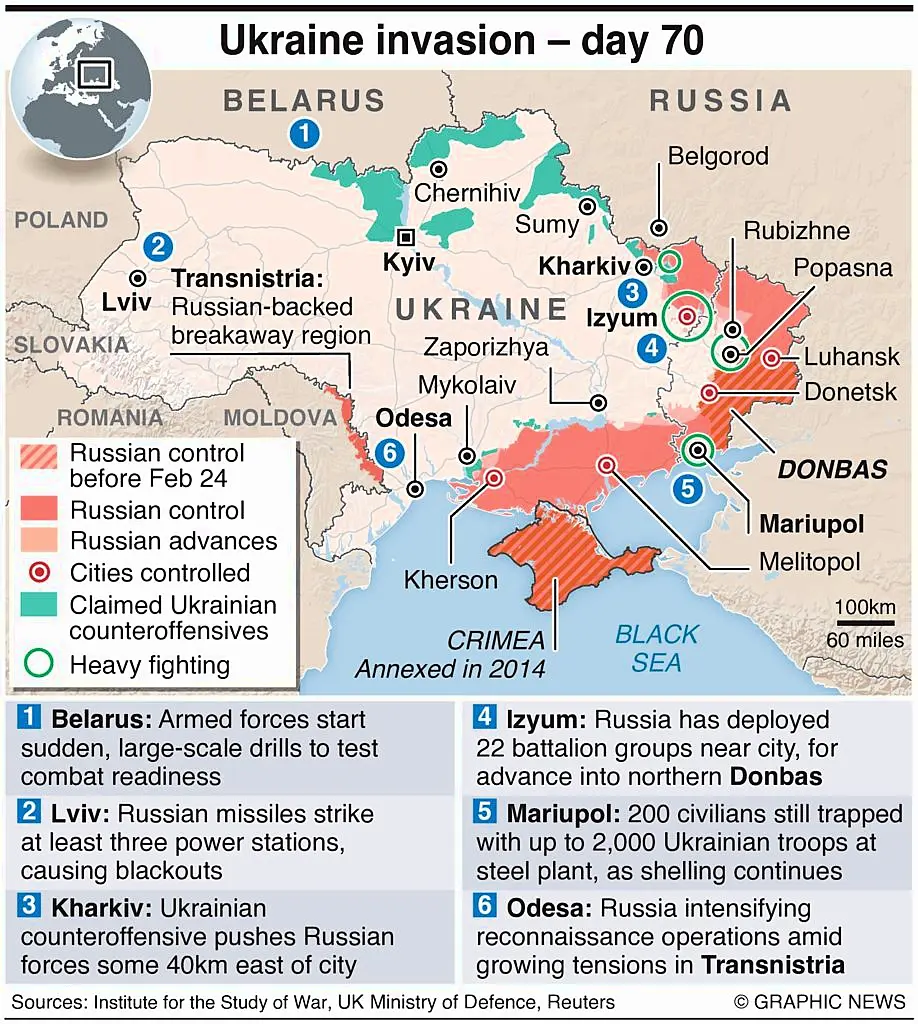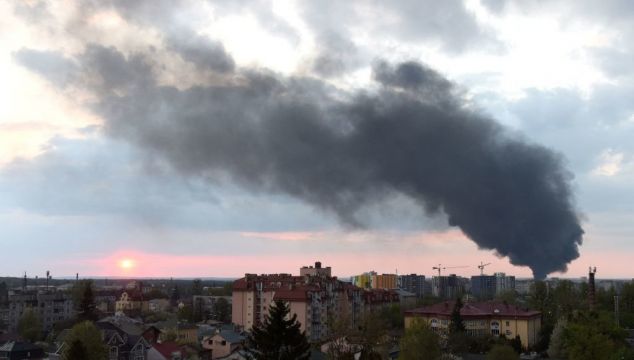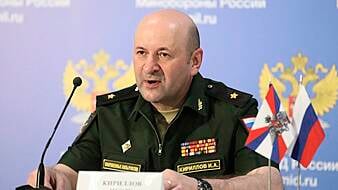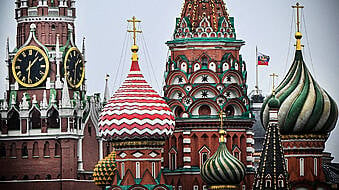The European Union proposed its toughest sanctions yet against Russia on Wednesday, including a phased oil embargo, as Kyiv said Moscow was intensifying an offensive in eastern Ukraine and close Russian ally Belarus announced large-scale army drills.
Nearly 10 weeks into a war that has killed thousands of people, uprooted millions and flattened Ukrainian cities, Russia was intensifying its assault, Ukraine's defence ministry said, with nearly 50 air strikes carried out on Tuesday alone.
Russia also stepped up strikes on targets in western Ukraine, saying it was disrupting Western arms deliveries.

A new convoy of buses began evacuating more civilians from the ravaged southeastern port city of Mariupol, which has seen the heaviest fighting of the war so far and where Moscow said remaining Ukrainian forces remained tightly blockaded.
Piling pressure on Russia's already battered $1.8 trillion economy, the European Commission proposed phasing out imports of Russian crude oil within six months and refined products by the end of this year, sending the price of Brent crude up by as much as four per cent.
"[President Vladimir] Putin must pay a price, a high price, for his brutal aggression," Commission chief Ursula von der Leyen told applauding EU lawmakers in Strasbourg.
The plan, if agreed by all 27 EU governments, would echo steps taken by the United States and Britain and be a watershed for the world's largest trading bloc, which remains dependent on Russian energy and must find alternative supplies.
US president Joe Biden said he would speak to other leaders of the Group of Seven advanced economies this week about possible additional sanctions against Moscow.
"We're always open to additional sanctions," Biden told reporters in Washington.
Ukraine's foreign minister Dmytro Kuleba welcomed the news from Brussels, but renewed Kyiv's plea for more aggressive steps to starve Russia's war machine.
"Don't get me wrong, we welcome that, but for six more months the EU countries will pay Russia billions of euros that will be invested in the Russian war machine," he told Austrian TV channel Puls 4 in an interview.
"My position is simple: every euro paid to Russia for gas, oil or other goods ends up as rounds of ammunition in Ukraine to kill my compatriots," he said, while calling for modern tanks and multiple launch rocket systems to protect territory.
The EU plan, which also targets Russia's top bank, its broadcasters, and hundreds more individuals, is not a done deal, with the Czech Republic, Bulgaria, Hungary and Slovakia all seeking time to adapt. EU envoys were expected to move closer to agreement when they meet again on Thursday.
The EU has yet to target Russian natural gas, used to heat homes and generate electricity across the bloc, and harder to replace than Russian crude.
The Kremlin said Russia was weighing various responses to the EU plans, adding that the sanctions would increase costs for European citizens.
'We are ready'
On the war front, Russian defence minister Sergei Shoigu renewed a warning that Moscow would seek to hit shipments of weapons into Ukraine by the United States and its Nato allies.
The Russian defence ministry said its forces disabled six railway stations used to supply Western arms to Ukraine's soldiers in the east. It said they also hit 40 military targets including four depots storing ammunition and artillery.
Ukraine's defence ministry said Russian strategic bombers fired 18 rockets "with the aim of damaging our country's transport infrastructure."
Russia published what it said was video footage of two Kalibr cruise missiles being launched from the Black Sea and said they hit unspecified ground targets in Ukraine.
Announcing surprise military drills, Belarus's defence ministry said they posed no threat to neighbours, but Ukraine's border service said it could not rule out that Belarusian forces might join Russia's assault.
"Therefore, we are ready," spokesman Andriy Demchenko said.
Some Russian forces entered Ukraine via Belarus when the invasion began on February 24th but so far no Belarusian troops have been involved in what Moscow calls a "special military operation" to disarm Ukraine and defend its Russian-speaking population from fascists.
Kyiv and its Western supporters say Moscow's fascism claim is an absurd pretext for an unprovoked war of aggression that has driven more than five million Ukrainians to flee abroad.
The Kremlin on Wednesday dismissed speculation Putin would formally declare war on Ukraine and decree a national mobilisation on May 9th, when Russia commemorates the Soviet Union's victory over Nazi Germany in World War Two. Putin is due to deliver a speech and oversee a military parade in Moscow's Red Square.
'We are not afraid'
The convoy leaving Mariupol, organised by the United Nations and the International Committee of the Red Cross, was heading for the Ukrainian-controlled city of Zaporizhzhia, Donetsk Governor Pavlo Kyrylenko said.
He did not say whether any more civilians had been evacuated from the Azovstal steel works, where the city's last defenders are holding out against Russian forces that have seized Mariupol.

The first evacuees from Azovstal arrived by bus in Zaporizhzhia on Tuesday after cowering for weeks in bunkers beneath the sprawling Soviet-era complex.
Mariupol mayor Vadym Boichenko reported heavy fighting at Azovstal on Wednesday and said contact with Ukrainian fighters there had been lost. More than 30 children were among trapped civilians awaiting evacuation, he added.
Russia now claims control of Mariupol, once a city of 400,000 but largely reduced to smoking rubble after weeks of siege and shelling. It is key to Moscow's efforts to cut Ukraine off from the Black Sea - vital for grain and metals exports - and link Russian-controlled territory in the south and east.
The southern coastline is, alongside the eastern Donbas region, Moscow's key target after its troops failed to take Kyiv, the capital, in the weeks after it invaded. - Reuters







